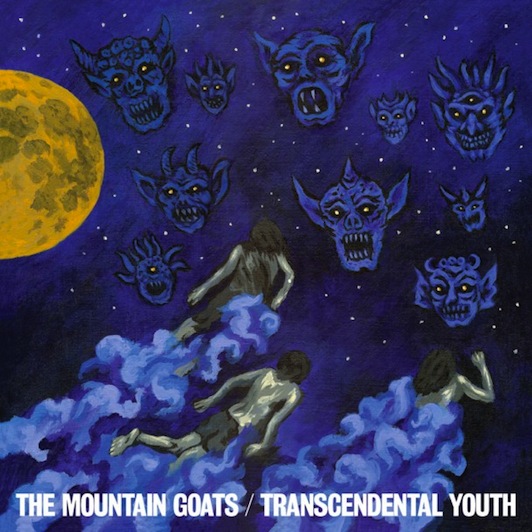John Darnielle isn’t just talking anymore. It’s been ten years since Darnielle took his Mountain Goats project to 4AD and began fleshing out his sound beyond the hyper verbose four track recordings of his earlier output. But even as recently as his Merge debut All Eternals Deck, it’s been the words that litter any Mountain Goats record that have garnered the most attention.
With good reason; Darnielle is a lyricist of the highest order. Eighteen years have passed since he sang Zopilote Machine highlight “Going to Georgia’s” heartbreaking, life-affirming, brilliantly simple central lyric, “The most remarkable thing about you standing in the doorway is that it’s you and that you’re standing in the doorway,” and it’s been only one since he pulled the stunningly evocative line “Let this whole town hear your knuckles crack,” on All Eternals Deck‘s opener “Damn These Vampires.”
Transcendental Youth is not without the thematic cohesion of earlier Mountain Goats records. According to interviews, Darnielle has said that the characters fucking up across Trascendental Youth are linked via psychological struggle. And those narrative ideas aren’t hidden. They crop up in half-rendered bits and lightly sketched pieces, in much the same ways that religious overtones appeared on 2009’s The Life of the World to Come. But it’s decidedly weird for Darnielle to come across as vague, as he does sometimes on Transcendental Youth.
As a consequence, some of the simple lines that would typically serve in Darnielle’s songs as catharsis instead come off as platitudes. “Let people call you crazy for the choices that you make” comes from opener “Amy aka Spent Gladiator 1.” With some of the gut-wrenching specificity on which Darnielle made his name on records like All Hail West Texas, such a line would be a call-to-arms. Instead, it falls just the slightest bit limp. “You can’t tell me what my spirit tells me isn’t true, can you?” he asks on “White Cedar,” and it seems just a bit condescending instead of communal.
But — and the “but” is pretty big — the arrangements across Transcendental Youth are uniformly stunning. The aforementioned “White Cedar” is maybe the most overtly gorgeous thing Darnielle has ever put to wax, with horns drawing Victorian arches over Darnielle’s hushed vocal performance. “The Diaz Brothers” is a kinetic burst of jabbed piano keys and a loose, playful rhythm. And “Cry for Judas” mixes Spanish horns, a bouncing bass line and an acoustic guitar that is remarkable for how cleanly immaculate it sounds.
Transcendental Youth clips along at what seems like a breakneck pace, as only two of its twelve songs surpass four minutes, and they only just do that. This brevity helps center the focus around the arrangement, as no two adjacent tracks pluck the same heartstrings, and no one track every overstays its welcome. Instead the mood and tone shifts every few minutes, making Transcendental Youth‘s refusal to stay in one place reflective of the buzzing anxiety of its characters.
It’s a bit uncomfortable to hear Darnielle and not immediately be drawn to his words, though the gradual shift has been growing with every post-Get Lonely record. And sometimes that discomfort distorts his normally impeccable storytelling. But with Transcendental Youth, the Mountain Goats have proven that they’re more than capable of engaging us with even without the unimpeachable witticisms of their frontman.

